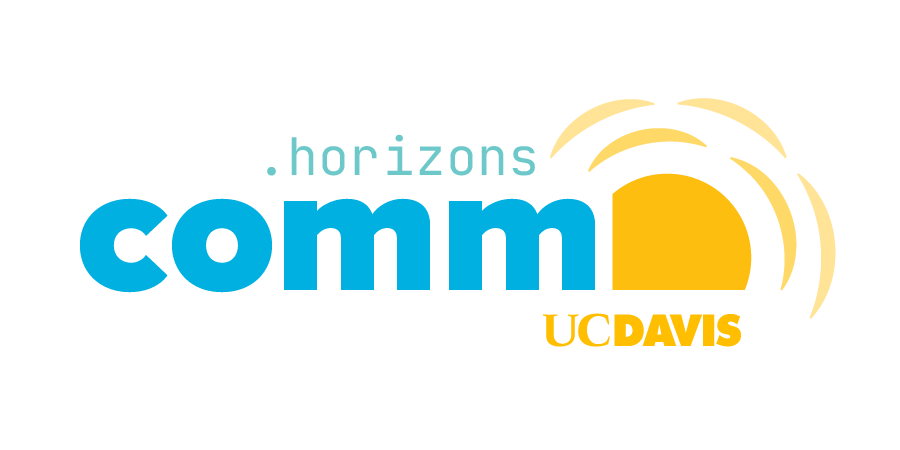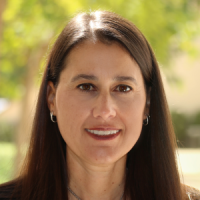
Comm Horizons @UCD 2025
We are excited to announce the second annual Communication Horizons Conference at UC Davis. This year's theme is "Media, Health, and Society: Exploring Wellbeing Across Lifespans and Diverse Communities."
The conference will take place at UC Davis May 16 - 18, 2025.
As the media landscape rapidly evolves and integrates deeper into our daily lives, understanding its impact on health and societal wellbeing becomes increasingly essential (Valkenburg, Beyens, Meier, & Abeele, 2022). This conference is dedicated to examining the intricate relationships between media and the mental, physical, and social health of individuals and communities across all ages and diverse backgrounds.
Agenda at a Glance:
Friday May 16, 2025
Teaching & Learning Center: Room 2215 (Google Maps Directions).
- 4:00pm - 4:30pm: Coffee & Refreshments
- 4:30pm - 4:35pm: Welcome & Introduction – Professor Bo Feng, Chair
- 4:35pm - 6:00pm: Mohrmann Lecture – Dr. Dana Mastro, UCSB
- 6:30pm: Hosted Reception: Mamma, 226 F St, Davis, CA 95616 (Google Maps Directions)
- 1 mile walk. Transportation available on request.
Saturday May 17, 2025*
Teaching & Learning Center: Rooms 1214 & 1218 (Google Maps Directions).
- 8:30am – 9:00am: Catered Breakfast
- 9:00am – 10:10am: Panels 1a (TLC 1214) and 1b (TLC 1218)
- 10:10am – 10:20am: Break
- 10:20am – 11:30am: Panels 2a (TLC 1214) and 2b (TLC 1218)
- 11:30am – 11:40am: Break
- 11:40am – 12:40pm: Keynote – Dr. David Markowitz, MSU (TLC 1218)
- 12:40pm – 1:30pm: Catered Lunch
- 1:30pm – 2:30pm: Panels 3a (TLC 1214) and 3b (TLC 1218)
- 2:30pm – 2:40pm: Break
- 2:40pm – 3:40pm: Panels 4a (TLC 1214) and 4b (TLC 1218)
- 3:40pm – 4:00pm: Coffee + Snack Break
- 4:00pm – 5:00pm: Panels 5a (TLC 1214) and 5b (TLC 1218)
- 5:30pm: No-Host Reception: Ruhstaller Farm, 6686 Sievers Rd, Dixon, CA 95620 (Google Maps Directions)
- Shuttle Pickup: Non-Visitor Lot 41 (Google Maps Directions)
- Buses will depart from Rhustaller to Davis hourly, until 10pm
Sunday May 18, 2025
- 9:30am: Depart UC Davis
- Shuttle Pickup: Lot 10 (Google Maps Directions)
- 11:00am: Wine Tasting + Cheese & Charcuterie, Ashes & Diamonds - $97/person (Includes tax + gratuity).
- 1:00pm: Lunch, Oxbow Market & Downtown Napa (paid on your own)
- 3:00pm: Depart for UC Davis
- 4:30pm: Arrive at UC Davis
*Keynote details and presentation agenda are shown at the bottom of this page.
Travel Information:
Airports
- Sacramento International Airport (SMF): 20 Miles from campus
- Oakland International Airport (OAK): 75 Miles from campus (we strongly advise against this option)
- San Francisco International Airport (SFO): 80 Miles from campus (we strongly advise against this option)
Airport Transportation
There is no direct public transit from SMF, OAK, or SFO to Davis. We recommend traveling by car (e.g., rental, rideshare). Depending on time of day, SMF is typically a 20-30-minute trip by car to Davis; SFO and OAK can take between 2-3 hours by car. The UC Davis Global Affairs Office provides more detail on getting to/from the Airport.
Hotels
SOLD OUT We have secured a room block at the Aggie Inn. All rooms in the block must be booked using this booking link (https://www.choicehotels.com/reservations/groups/OE84P2). The nightly rate is $159 + tax (single queen) or $169 + tax (single king). Hotel rooms must be booked by April 18, 2025.
There are many hotel options in downtown Davis that are a short walk from campus. If you are looking for other recommendations, the Hyatt Place UC Davis is comfortable and well-located.
Parking
The closest parking lots are Visitor Lot 40 (Google Maps Directions) and the Pavilion Structure (Google Maps Directions). Payment is required on Friday. You must download and use the Aggie Park App to pay for parking ($17.00). Parking is free on Saturday.
Reception & Napa Transportation:
We will walk to Friday's reception (1 mile walk; transportation available on request). We will provide transportation to/from Saturday's reception and Sunday's trip to Napa.
Presentation Guidelines:
Plan for an 8 minute presentation + Q&A. You will be able to connect a laptop with a standard HDMI cable (please bring an HDMI adapter if necessary).
Wine Tasting Payment:
To pay for wine tasting, please send $97 to Richard Huskey using one of these methods:
Important Payment Details:
If your payment is not received by EOD May 3 you will not be able to attend the wine tasting trip. This is a firm deadline. Please email Richard Huskey (rwhuskey@ucdavis.edu) if you have any concerns.
Keynote Speakers:

Mohrmann Lecture: Dana Mastro (University of California, Santa Barbara)
Title: Navigating Threatened & Misrepresented Identities: Media, Self, and Group
Abstract: Media can play a meaningful role in shaping how individuals view their own group and other groups, producing a range of beliefs and emotions that can affect how people interact with the social environment. When one's group is threatened or misrepresented in the media, it can have detrimental implications for self- and group-concept that motivate a variety of actions to manage the damage to the group and the potential harm to one's well-being. The current presentation addresses research on how these threats manifest in strategic communication patterns with ingroup members, attempts to protect the group and oneself, and even collective action efforts.
Bio: Dana Mastro (Ph.D., Michigan State University) is Associate Vice Chancellor for Academic Personnel and Professor of Communication at the University of California, Santa Barbara. Her research is aimed at increasing our understanding of the influence of media on perceptions of self and other as well as on intergroup dynamics in society. To this end, her work (a) documents overarching patterns in the representation of distinct groups across media platforms and genres and (b) investigates the influence of exposure to these characterizations on media users' cognitions, emotions, and behaviors. In testing these relationships her research incorporates a broad range of quantitative methods (e.g., content analyses, experiments, longitudinal studies) and diverse bodies of literature including those rooted in social identity theory and self-categorization theory as well as other identity-based frameworks. She is a Fellow of the International Communication Association. She is currently the chair of the Mass Communication Division of the International Communication Association and a past chair the Mass Communication Division of the National Communication Association. Her research can be found in journals such as Journal of Communication, Human Communication Research, Communication Monographs, Communication Research, Media Psychology, and the Journal of Broadcasting & Electronic Media, among others.

Communication Horizons Keynote: David Markowitz (Michigan State University)
Title: Words as Medicine: Transforming Health and Scientific Outcomes Through Language
Abstract: Language serves as both a window into psychological states and a transformative tool for health outcomes. This talk explores how analyzing the meaning and psychological dimensions of words can uncover and possibly mitigate healthcare disparities. Through evidence-based linguistic interventions, I also demonstrate how language can function as “medicine,” enhancing healthcare delivery, science communication, and patient perceptions of medical professionals. The presentation concludes with strategies for scaling these approaches through generative technologies, offering practical pathways to implement linguistic insights across the social and medical sciences.
Bio: Dr. David M. Markowitz is an associate professor in the Department of Communication at Michigan State University. He uses language patterns from natural databases to infer what people are thinking, feeling, and experiencing psychologically. His work has appeared in outlets such as Science Advances, the Proceedings of the National Academy of Sciences, Journal of Communication, and Journal of Personality and Social Psychology. In 2022, Dr. Markowitz was named a "Rising Star" of the Association for Psychological Science. He received his PhD from Stanford University and his undergraduate and master’s degrees from Cornell University.
Detailed Panel Agenda:
Panels 1a and 1b: 9:00am – 10:10am
| 1a: Bias, Bots, and Believability: Media Influence and Perception in the Age of Algorithms | 1b: Digital Inequities and Interventions: Empowerment, Disconnection, and Wellbeing Across Cultures |
| TLC 1214 | TLC 1218 |
| Chair: Zhengyi (Sophie) Liang | Chair: Allyson Snyder |
Systematic Bias or Congeniality? Auditing YouTube Recommendation Algorithms from a Longitudinal Perspective Miner Ye & Magdalena E Wojcieszak | Cross-Cultural Similarities Timothy R. Levine |
In-group Favoritism or Out-group Hostility? Exploring Political Bias in YouTube Recommendation Systems Claire Wonjeong Jo, Xudong Yu, & Magdalena Wojcieszak | A Spanish-Language Digital Media Literacy Intervention Improves Misinformation Discernment among American Latinos Angela Y. Lee, Fangjing Tu, Ryan Moore, Alondra Martinez, Natalia Galperin, & Jeffrey T. Hancock |
Detecting Synthetic but Doubting Authentic: Perceptual Bias Towards AI in Political Imagery Harry Yaojun Yan, Ryan C. Moore, Fangjing Tu, & Jeffery T. Hancock | Fostering Empowerment to Address Birth Control Misinformation among Young Women: Effects of Bypassing Strategies on Social Media Engagement Christopher Calabrese, Erin Ash, Ashley Hedrick McKenzie, Haoning Xue, Yoo Jung Oh, & Berit Oxley |
A Microphone for Dogwhistles: Examining the Role of the Popular Media in Amplifying Implicit Violent Political Rhetoric Kurt Braddock | Disconnection amid inequality: An intersectional approach to ethno-racial minoritized young women’s digital media (non)use and well-being in Flanders (Belgium) Tom De Leyn, Mariek Vanden Abeele, & Ralf De Wolf |
The Negativity Bias For News: A Value-Based Decision Making Study Ziyu Zhao, Xuanjun Gong, Rachael Kee, Allyson Snyder, Elizabeth Riggs, Jason Coronel, Ezgi Ulusoy, Allison Eden, Amber Boydstun, & Richard Huskey | The Hierarchy of Digital Disconnection: Social Norms, Status, and the Contradictions of Connectivity Marthe Mennesa, Tom De Leync, Marijke Verbruggend, & Heidi Vandebosch |
The Negativity Bias For News: A Computational Neuroimaging Investigation Rachael Kee, Xuanjun Gong, Ziyu Zhao, Allyson Snyder, Elizabeth Riggs, Jason Coronel, Ezgi Ulusoy, Allison Eden, Amber Boydstun, & Richard Huskey | Intervening in the Digital Cycle: A Case Study on Adolescents' Social Media Habits and Self-Regulation Anja Stevic & Sunny Xun Liu |
Panels 2a and 2b: 10:20am – 11:30am
| 2a: Chatbots, Companions, and Controversies: Human Connection in the Age of Generative AI | 2b: Media, Meaning, and Mental Health: Understanding Media’s Role in Identity, Emotion, and Wellbeing |
| TLC 1214 | TLC 1218 |
| Chair: Diane Kim | Chair: Samantha Vigil |
Does LLMs Ego Develop? Understanding the Developmental Maturity of Large Language Arti Thakur, Tom Murray, & Martin Hilbert | Understanding Family Processes of Media-Based Ethnic-Racial Socialization of Young Children: A Mixed Method Study with Diverse Parents Living in the United States Jane Shawcroft, Allyson L. Snyder, Fashina Alade, Aimie Nguyen, Jeanette Ruiz, & Drew P. Cingel |
Relational Communication in AI Companionship: An Examination of Self-Disclosure in Human-Replika Interactions Haojian Li, Renwen Zhang, Lisa Jihyun Hwang, Bo Feng, & Han Li | Developing a Comprehensive Media Literacy Scale Sijia Qian, Cuihua Shen, Huiyi Wang, & Hichang Cho |
The Psychological Benefits of Communicating With Chatbots are Greatest When Machine Strengths are Emphasized Angela Y. Lee, Kristina Rapuano, Alex Liebscher, Moritz Sudhof, Kate Niederhoffer, & Jeffrey T. Hancock | Mental Health and Media Selection: In Search of Mechanisms Valerie Klein, Xuanjun Gong, Allison Eden, & Richard Huskey |
Is Intimacy the New Attention? An Algorithmic Audit of Intimacy in LLM Interactions Arezoo Ghasemzadeh, Arnav Akula, Sruthy Sabesan, Pearl Vishen, Bharadwaj Tallapragada, & Martin Hilbert | The One vs. Many: Preferential Attachment in Narrative Network Predicts Success of Narratives Xuanjun Gong, Allison Eden, & Matthew Grizzard |
A Continuous Measure of Hate Using Generative AI Joseph B. Walther, Zichao Li, & Yidi Zhang | Humor Perceptions and Political Identity During 2024 US Presidential Elections Prateekshit "Kanu" Pandey |
Are LLMs Giving Us a Distorted Public Picture? Uncovering Accuracy Gaps in AI Analysis of Health Messages Soojong Kim | Triangulating Brain, Behavior, and Screens: Insights and gaps from the ABCD Study on Problematic Media Use Kylie Woodman |
Panels 3a and 3b: 1:30pm – 2:30pm
| 3a: From Cradle to Cloud: Navigating Technology, Bias, and Wellbeing in Daily Life | 3b: AI for Health: Innovations in Communication, Coaching, and Care |
| TLC 1214 | TLC 1218 |
| Chair: Sofia V. Rhea | Chair: Emily McKinley |
Media Use by Kids Age Zero to Eight: An Examination of Family Perspectives and Device Adoption Among Young Children Supreet Mann, Angela Calvin, Michael Robb, Amanda Lenhart, & Alexa Hasse | Enriching Persona-Driven Chatbot Interactions: A Multimodal AI Experiment for Personalized Diet Health Linq Lu, Yifan Deng, Chuan Tian, Sijia Yang, & Dhavan Shah |
Unveiling Gender Bias in AI-Generated Job Descriptions Jennifer M. Krebsbach, Jane E. Lee, Steven Zeck, Arti Thakur, & Martin Hilbert | Large Language Model (LLM)-Based Health Coaches in Virtual Reality (VR): Effects Of AI Agents’ Nonverbal Behavior on Rapport and Health Outcomes Sue Lim, Ralf Schmälzle, & Gary Bente |
Beyond the Individual Level: A Social-Ecological Perspective to Understanding Technology Maintenance Barriers and Strategies Among Low-Income U.S. Adults Laurent H. Wang, Amy L. Gonzales, & Clarissa Rios | Face-to-Face Therapy vs. Computer-Mediated Therapy for College Students: Single Session Outcomes and Implications for Patient-Therapist Relationships Rachel E. McKenzie, Lisa Jihyun Hwang, Bo Feng, & Emma Jane Phillips |
From Screens to Sensors: A Contextual Integrity Approach to Understanding Privacy Norms Across Mobile Health Devices Leheng Lin & Laurent H. Wang | Communicating AI in Public Health: Trends from 2000 to 2024 Catherine Chen, Tzu-Kun Hsiao, Pei-Ying Chen, & Fangli Geng |
A New Tool for Sleep Science: Software Development to Capture EMA Data Rachael Kee & Richard Huskey | The Role of the Popular Media Food Environments in Shaping Food Perceptions: Content Analysis of Food Incidents in America’s Top Popular Shows 2013-2024 Eulàlia P. Abril |
Panels 4a and 4b: 2:40pm – 3:40pm
| 4a: Message, Medium, and Machine: Evolving Models of Persuasion and Governance in Digital Contexts | 4b: Who We Are Online: Identity, Emotion, and Wellbeing in Social Media Use |
| TLC 1214 | TLC 1218 |
| Chair: Salman Khawar | Chair: Claire Wonjeong Jo |
The Youth Digital Policy Repository; An In-Progress Tool for Tracking Social Media Legislation Samantha L. Vigil, Drew P. Cingel, Jane Shawcroft, & Sarah M. Coyne | The Role of Identity Processes and Motivations in Perceptions of Social Media Use Serena Soh, Zhenchao Hu, Sanaz Talaifar, Alan Meca, Rui Pei, Samantha J. Grayson, Sumer S. Vaid, Nilam Ram, Jamil Zaki, & Gabriella M. Harari |
Online Communities as Model Systems for Commons Governance Seth Frey | Sensing Smartphone Use in Context: Effects on Social and Affective Well-Being Katherine Roehrick, Mahnaz Roshanaei, Serena Soh, Sumer Vaid, Joseph Bayer, & Gabriella M. Harari |
Persuasion in Descriptions of Medical Crowdfunding on GoFundMe: When Children Fundraise for Their Mothers’ Lung Cancer Ziyu Zhao | I Am, Therefore, I Choose: An Investigation of How Youths’ Social Identities Drive Their Media Choices and How These Choices Impact Well-Being Enrica E. Bridgewater, Miranda Reynaga, Brittany Ribeiro Brown, & L. Monique Ward |
AI as Humans?: Using LLMs to Synthesize Human Responses in Persuasive Contexts Emily McKinley, Yoo Jung Oh, Abdulaziz Alhumaidy, & Jingwen Zhang | Social Media for a Better Night’s Sleep? Associations Between Evening Use of Social Media to Recover From Stress and Sleep Quality Morgan E. Ellithorpe, Sara M. Grady, Allison Eden, Dominique Wirz, Ezgi Ulusoy, & Christian Reilly |
Multimodal LLMs for Health Persuasion: Promising in Feature Discovery, Limited in Human Response Simulation Yibing Sun, Linqi Lu, Hyerin Kwon, Yilang Peng, & Sijia Yang | Inclusion, Ostracism & Rejection Online: How Social Media Likes/Dislikes Impact Basic Psychological Needs Sara M. Grady |
Panels 5a and 5b: 4:00pm – 5:00pm
| 5a: Stories We Live By: Parasocial Bonds, Fandom, and Wellbeing in Media | 5b: Networks of Belonging: Loneliness, Identity, and Connection in Mediated Relationships |
| TLC 1214 | TLC 1218 |
| Chair: Saba Kolahchian | Chair: Muhammad Ehab Rasul |
Beyond Content: A Digital Agronomy Approach to Promoting Youth Well-Being Allyson L. Snyder & Sofia V. Rhea | The Lonely Mind Processes Media Content in Idiosyncratic Ways Elisa Baek |
Fiction Fanship and Wellbeing: Negative Self-States and Fan Identification and Practice Laramie D. Taylor | Loneliness and Network Structure Among Young Adults Connor Mitchell |
Understanding Fan Interaction from the Supportive Communication Perspective: Support Seeking and Provision Behaviors on Popular Music Subreddits Sofia V. Rhea, Rachel E. McKenzie, Aimie Nguyen, Sydney Lopez, & Laramie D. Taylor | Communication Channels and Relationship Maintenance: Exploring Media Multiplexity Theory Among Peers in College Mahnaz Roshanaei, Sumer S. Vaid, Jamil Zaki, & Gabriella M. Harari |
Emotional Investment, Anthropomorphism, and Well-Being Implications in Those Who Engage in Parasocial Relationships Sydney C. Lopez & Abraham M. Rutchick | The Role of Deservingness, Pain, and Social Approval in Social Media-Induced Envy for Underrepresented Groups Enoch Montes |
Wellbeing and the Reflective Afterlife of Stories Sara M. Grady, Manushka Sondhi & Allison Eden | Continuing Tradition or Allowing for Transformation?: Online Dating as a Potential Site of Gender Innovation Cristina Zito |
Contact:
For inquiries, please email Conference Organizers (Richard Huskey; Heather Jane Hether; Soojong Kim) at horizonconf@ucdavis.edu.
Conference Organizers:
This conference is organized by Drs. Richard Huskey, Heather Jane Hether, and Soojong Kim. Support for the conference itself is generously provided by the Department of Communication at UC Davis.
